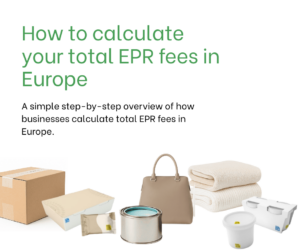Stricter EPR battery Compliance in Europe — Key Updates
Stricter EPR battery Compliance in Europe — Key Updates
Our team advises companies that work with cross-border products, and the new EPR battery rules in Germany and Denmark stand out for their direct operational impact. The updates apply to producers, importers and digital sellers. Firms now make internal checks to align with the revised registration models.
Companies that still rely on old procedures face real exposure. The EPR battery updates in both countries now require stronger verification, and outdated records may lead to blocked entries. Firms that treat these changes as optional risk delays in market access.
The structure of the EPR battery duties may appear strict, but the logic becomes clear after a closer look. Each country follows a defined set of steps, and these steps help firms plan internal work. The changes affect reporting, category checks and representative duties.
 If your company needs help with EPR registration or reporting, our team can support every step – from classification and documentation to ongoing compliance checks.
If your company needs help with EPR registration or reporting, our team can support every step – from classification and documentation to ongoing compliance checks.
Germany’s updated system for EPR battery registration
Germany introduced new rules for all firms placing batteries on its market. The battery EPR framework now follows the structure of the EU regulation, and this creates more direct control of product records. Each producer must ensure correct classification for all items.
The German register uses five categories. Firms review their portfolio and assign each product to the correct type. This duty supports a clear link between the battery EPR record and the treatment route for returned units.
Foreign companies must appoint a local representative. This person handles compliance tasks and keeps contact with the authority. The representative becomes part of the German EPR process, and firms must provide confirmed details.
Germany now requires chemical composition data for all categories. This information helps classify products and improve collection planning. The German EPR checks include a review of chemistry details during routine updates.
All firms must show participation in a take-back scheme. This duty covers portable and larger battery types. Companies must keep evidence of scheme membership as part of the EPR for battery file.
Operational impact of the German EPR structure
Companies working under German rules must review older entries. Some records were created before the updated model, and these must now match the new format. The German EPR duties expect accurate category assignment for each product.
Manufacturers must check their category mapping. The five-category structure replaces older distinctions. This step ensures that treatment partners receive correct information. It also supports the EPR for battery process at national level.
Companies must check take-back contracts. Portable batteries require participation in an approved scheme. Larger categories may use individual arrangements, but proof must be available. This forms part of the German EPR checks performed annually.
Foreign companies must name an authorised representative. This person must be based in Germany. The representative receives all compliance messages and updates.
Firms must follow reporting deadlines. The national register uses fixed dates, and these dates apply to all sellers. Accurate data helps avoid delays in category approval.
Denmark introduces a new framework for battery EPR obligations
Denmark released updated rules that align with the EU model. The EPR for battery duties apply to all suppliers placing products on the Danish market, including digital-first sellers. Firms must prepare documents in advance to avoid slow approval.
The Danish register asks for chemistry information and expected volumes for the year. These details support planning within the EPR for batteries process and help the authority estimate collection needs.
Foreign companies must appoint a local representative. This ensures that communication remains consistent. The Denmark EPR rules apply even when the seller relies on online platforms or cross-border stock.
Suppliers of portable and LMT batteries must join a recognised take-back scheme. The rule forms a central part of the national structure. It ensures that users have access to return points in all regions.
Denmark uses a structured reporting cycle. Firms must provide updated figures for sales and recovered units. This cycle supports the Denmark EPR process and keeps national records consistent.
How firms comply with the Denmark EPR duties
Companies selling into Denmark must follow the initial procedure set by the register. The Denmark EPR system asks for chemistry details and expected volumes. These numbers help the authority manage upcoming return flows.
Portable and LMT batteries require scheme membership. These duties apply to all suppliers, including online firms. Scheme records form part of the file reviewed under the EPR for batteries checks.
Foreign sellers must appoint a representative. This rule ensures that updates reach a responsible contact. The representative must be based in Denmark, and firms must keep their details available.
Denmark uses a structured schedule for reporting. Each cycle covers sold units and recovered material. This supports planning for treatment partners.
Suppliers must check fee information. Some entries require new fees, and others use lower amounts for updates. These details are listed in the national portal and support routine work within the EPR for battery ruleset.
Comparative view of EPR for batteries in Germany and Denmark
Below is a small comparison table that outlines central elements of the updated systems.
| Element | Germany | Denmark |
| Registration duty | Covers all producers, foreign firms require representative | Covers all suppliers, foreign firms require representative |
| Take-back duty | Mandatory for all categories | Mandatory for portable and LMT |
| Classification | Five EU-aligned categories | Five EU-aligned categories |
| Reporting cycle | Uses chemistry and scheme details | Uses chemistry and expected quantities |
Both countries follow the same category structure. This helps firms that work across multiple markets and need predictable rules. The updated EPR for batteries systems also use structured checks to verify data.
Practical steps for companies handling EPR for battery compliance
Below is the first list that covers steps firms must take:
- Review category assignments for all products under battery EPR rules
- Check chemistry records to ensure compliance with local duties
- Confirm scheme membership for portable batteries
- Assign an internal owner for compliance tasks
- Verify representative details for sellers based outside local borders
The next list covers checks that firms must complete on a regular basis:
- Review supply data to confirm alignment with epr batteries obligations
- Compare entries in national registers with internal records
- Check scheme fee details before submissions
- Prepare data for upcoming reporting cycles
- Cross-check figures with internal sales systems

You can book a free demo of the Lovat platform, where our specialists will show how the system works and answer any EPR-related questions.
Structural impact on firms under the wider EPR battery model
The updated rules in both countries affect how companies plan their work. Firms now update internal records more often to keep information accurate. This supports clear activity under the EPR battery structure and reduces errors.
Manufacturers review sourcing documents to include chemistry details. This duty applies to all categories and supports checks in national registers.
Online sellers must confirm that their products hold valid registration. Platforms have increased checks, and entries linked to battery EPR records form part of standard verification.
Internal audits become more important. Firms track volumes and recovery figures to prepare for upcoming reporting cycles. These checks reduce the risk of delays.
Companies review packaging and documentation to match national rules. This supports user awareness and ensures that items meet local requirements.
Conclusion
Germany and Denmark updated their battery rules, and firms must follow the new structure. Companies that manage registration, reporting, category checks and scheme membership avoid delays in market access. Early preparation helps reduce administrative effort and supports stable operations.



